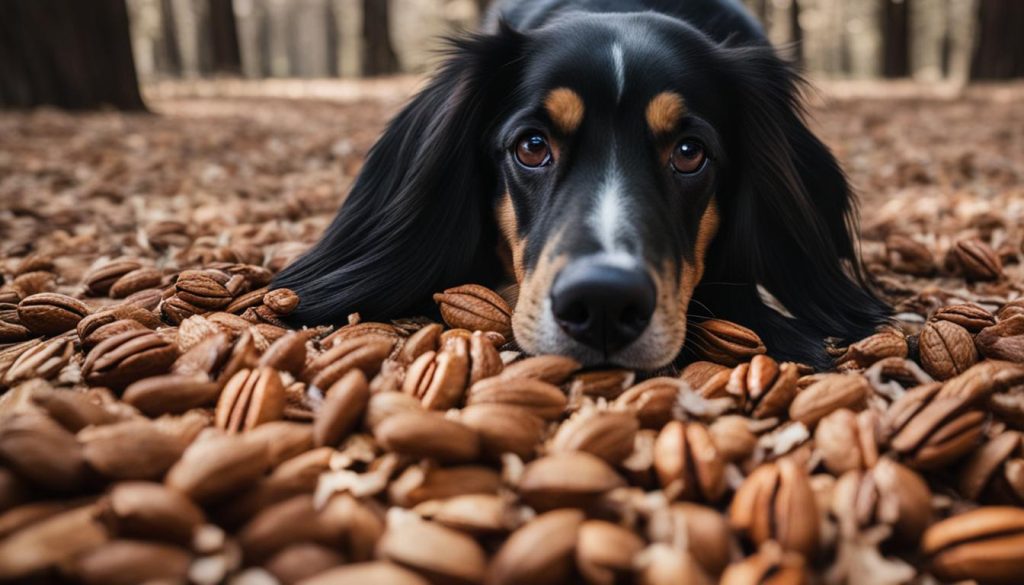As a dog lover and a keen observer of pet health trends, I’ve seen countless treats dubbed as ‘healthy’ for our furry companions. However, I’ve also learned that not all human favorites are safe for pets. Today, let’s talk about whether canines can partake in the joys of munching on pecans and what pet safety measures need to be considered.
The benefits of these nuts for us humans are undeniable—with their nutrients like potassium, calcium, magnesium, and monounsaturated fats known for helping in lowering cholesterol. Nonetheless, Dr. Jerry Klein, Chief Veterinary Officer for the AKC, cautions that these tasty morsels can be harmful to our four-legged friends. Let’s peel back the layers on pecans and dive into the specifics of pet safety.
Can Dogs Eat Pecans? No, they can’t.
- Pecans contain a toxic compound called juglone that is hazardous to dogs and can lead to significant digestive issues.
- These nuts also carry a choking risk, and even worse, they might be laced with molds that produce the dangerous toxin aflatoxin.
- Recognizing the immediate and long-term health concerns associated with pecans can save your dog from serious ailments.
- It’s crucial for pet owners to prevent their dogs from ingesting pecans to avoid the potential for juglone toxicity and other health complications.
- Seek emergency veterinary care if your dog accidentally consumes pecans to mitigate any adverse effects expediently.
The Hidden Risks of Feeding Pecans to Your Dog
As much as I love finding healthy snacks for my furry friends, it’s crucial to be aware that not all human favorites are safe for dogs. While pecans are nutritious for people, they’re actually considered toxic foods for dogs due to a few hidden risks that pet owners need to be mindful of to protect their dog’s health.
Understanding Juglone Toxicity in Pecans
Juglone is an organic compound present in pecans that spells trouble for canines. Even though this substance may not affect humans, juglone toxicity can cause a range of unpleasant symptoms in dogs, such as vomiting and gastrointestinal upset. Pecans and dog health certainly do not mix, and with juglone also found in walnuts, it’s a good reminder to keep these nuts out of reach from our four-legged pals.
The Dangers of Mycotoxins and Aflatoxin
Mycotoxins are another toxic threat when it comes to dogs and pecans. Certain molds, which may not be visible to the naked eye, can grow on pecans, producing these harmful mycotoxins. When ingested by dogs, these toxins can lead to serious conditions like tremors and seizures. Specifically worrisome is the Aspergillus mold, often associated with pecans, that creates aflatoxin, a known carcinogen that can be deadly to dogs even in small amounts.
Choking Hazards and Digestive Concerns
Beyond the invisible risks, pecans pose a very tangible threat due to their size and shape, which can cause choking or digestive blockages, particularly in smaller dog breeds. Additionally, the high-fat content in pecans might trigger a case of pancreatitis or gastroenteritis, conditions that are not only painful for dogs but can also be complicated and costly to treat. So, keep in mind that pecans and dog health are not compatible, and we should always strive to keep our pets safe by avoiding such toxic foods for dogs.
Can Dogs Eat Pecans? Uncovering the Truth
As I delve into the world of canine nutrition, it’s important to tackle common misconceptions, especially when it comes to pecans and dog diet. To many, pecans are a tasty and nutritious snack synonymous with health benefits for humans. Yet, when we consider our furry friends, the reality is starkly different.
If you’re like me, always looking to share wholesome treats with your pet, understanding what’s safe is crucial. Pecans, despite their allure, pose significant dangers to dogs. The culprit behind this is juglone toxicity – a substance that, though harmless to humans, can wreak havoc on a dog’s digestive system. The inclusion of pecans, even in moderation, carries the potential to cause not just digestive unrest but neurological damage as well.
Beyond the immediate toxic effects, there’s an additional layer of risk concerning pecans and dog allergies. Just as with humans, dogs can develop allergies to specific foods. Pecans might trigger an allergic reaction that can go from mild skin irritation to more severe responses like anaphylaxis, which is life-threatening.

Given these facts, it’s my duty as a pet owner to caution against succumbing to those big, pleading eyes seeking a bite of my pecan pie. It’s clear that regardless of the health gains I might enjoy from this nut, they’re not shared by my four-legged companion. The truth is, no matter how deceptively appealing, pecans have no place in a dog’s diet – even as an occasional indulgence.
Remember, treating our pets with food that’s safe for them is an act of love. Ensuring we avoid pecans is just part of keeping our cherished dogs’ diets healthy and happy.
Recognizing the Symptoms of Pecan Poisoning in Dogs
As a dedicated pet owner, I understand how crucial it is to be aware of what foods can harm my furry friend. That’s why recognizing pecan poisoning is essential. Pecans, although nutritious for humans, can wreak havoc on a canine diet. If you suspect your dog has ingested pecans, observing their behavior closely becomes imperative for their well-being.
Identifying Immediate Reactions: Vomiting and Diarrhea
Immediate signs of distress after a dog consumes pecans may include vomiting and diarrhea. That’s why I always keep an eye on my dog after they’ve gotten into something they shouldn’t have. These symptoms can escalate quickly and require prompt attention to prevent further complications.
Neurological Symptoms: Tremors and Seizures
Neurological issues in dogs should never be taken lightly. When moldy pecans are the culprit, the stakes are even higher. I pay close attention to any unusual signs such as increased urination, muscle weakness, or tremors, knowing that these might indicate neurological upset in my dog, possibly leading to seizures.
Longer-Term Issues: Gastroenteritis and Pancreatitis
While immediate reactions are critical to spot, I’m also conscious of the longer-term issues that can arise, like pancreatitis and gastroenteritis. These inflammatory conditions can be debilitating, and possibly life-threatening, impacting the quality of life for my dog. It’s why pecans are a no-go in our home and a rule I encourage other pet owners to follow as well.
Safer Alternatives: Nut Options for a Healthy Canine Diet
When I’m looking to reward my furry companion with a something special, I make sure it’s both delicious and safe. It’s well-known among pet lovers like myself that some nuts should be off the menu for dogs. So, let’s talk about what nuts can safely be included in their diet!
Opting for Dog-Safe Nuts: Cashews and Peanuts
My go-to treats for a quick snack are cashews and peanuts, which are generally safe nuts for dogs when given in moderation. Unlike pecans and other harmful nuts, they don’t contain toxic compounds. Nonetheless, I’ve learned to be mindful of the salt and to avoid any added flavors or coatings that could be harmful to my pooch. Portion control is also important because excessive nut consumption for dogs can lead to unwelcome weight gain due to the dietary fats these nuts contain.

Understanding the Risks of Other Popular Nuts
While cashews and peanuts can be part of my dog’s diet, I learned that other nuts aren’t so dog-friendly. For instance, almonds and pistachios aren’t toxic but aren’t ideal for dogs due to their shape and size, which present a possible choking hazard. It’s always better to be safe than sorry, so I prefer to steer clear of these, even though they might not be toxic.
Avoiding High-Fat Traps and Choking Dangers
Browsing through the snack aisle, I always avoid anything that’s high in fat or could cause my pup to choke. High-fat treats can be a real trap, leading to issues like pancreatitis in dogs who are prone to it. Small, round, or hard foods can easily become lodged in a dog’s throat. So, when I do indulge my pal in a little nutty treat, I make sure it’s the right size and texture to avoid any scary incidents.
As a devoted dog owner, my priority is always the health and happiness of my canine friend. That’s why I take the time to understand which nuts are safe and which ones to avoid, ensuring a well-balanced diet rich in safer treat options.
Emergency Response: What to Do if Your Dog Eats Pecans
When it comes to emergency veterinary care for our beloved companions, knowing the right steps to take can make all the difference. If I discover that my dog has had a toxic nut ingestion, my immediate response is crucial. The first thing I do is contact my veterinarian or an emergency pet hospital right away—time is of the essence. While it may seem like a minor matter to some, even a small number of pecans can cause adverse effects in dogs.
Next, I ensure that no more pecans are within reach. Swiftly cleaning up any fallen nuts not only prevents further ingestion but also allows me to better estimate how much my dog might have eaten. Keeping a vigilant eye on my dog for any signs of discomfort or unusual behavior is essential in these initial moments after ingestion. Symptoms such as vomiting or diarrhea, especially if blood is present, are serious and indicate that my dog needs urgent veterinary attention.
Experts typically recommend against trying to induce vomiting at home unless specifically instructed by a professional. It’s not a simple decision and in some cases, it can do more harm than good. Instead, I follow the guidance provided by my veterinarian, who may advise on specific home care treatments or recommend bringing my dog in for an examination and potential medical treatment to ensure their safety and well-being after consuming pecans.
Conclusion
Wrapping up our discussion on dogs and pecans, it’s clear that while these nuts are a wholesome snack for humans, they represent a starkly different story when it comes to our canine companions. The risks associated with pecans—ranging from juglone toxicity to the presence of harmful molds—outweigh any potential benefits they could possibly offer to our pets’ diets. As a responsible pet owner, I cannot stress enough the importance of keeping these nuts out of reach from curious paws and whiskers.
Moreover, it’s vital for us to recognize that a proper canine diet and pecans do not mix. Steering towards dog-friendly nut options is a safer path to tread, though we must remain intuitive to the hazards these alternatives might carry as well. My advice leans heavily towards consulting with a veterinarian to gain a clearer understanding of appropriate treats that align with our dogs’ specific dietary needs.
In the event of an accidental pecan ingestion, immediate action is imperative. Reaching out for veterinary care promptly could make all the difference in preventing or addressing any health complications that might follow. Ultimately, our goal as pet parents is to foster a safe and healthy environment, so let’s make educated decisions when it comes to what we allow our furry friends to nibble on.
FAQ
Can dogs safely eat pecans?
No, dogs should not eat pecans. They contain a toxic compound called juglone, which can cause significant digestive issues, and they are also a choking hazard and could potentially contain harmful molds like Aspergillus that produce a toxin called aflatoxin.
What is juglone toxicity and how does it affect dogs?
Juglone is a toxic substance found in pecans and walnuts that can cause vomiting, diarrhea, and gastrointestinal distress in dogs. Ingesting nuts containing juglone can lead to substantial digestive issues and even neurological damage.
Are any mycotoxins in pecans dangerous to dogs?
Yes, certain molds that can grow on pecans, such as Aspergillus, can produce mycotoxins like aflatoxin which are highly dangerous and can lead to tremors, seizures, and severe neurological issues in dogs.
What should I do if my dog has eaten pecans?
If your dog has eaten pecans, watch for symptoms such as vomiting, diarrhea, increased urination, muscle weakness, and tremors. Contact your veterinarian promptly, especially if severe symptoms like blood in vomit or diarrhea occur. Avoid inducing vomiting unless instructed by a veterinarian.
What nuts are safe for dogs to eat?
Nuts that are generally considered safe for dogs in moderation include cashews and peanuts. They do not contain the toxic compounds found in pecans. However, they are high in fats and should be given sparingly, preferably unsalted, and without any coatings or seasonings.
Can feeding nuts to dogs lead to health issues?
Yes, feeding nuts to dogs can lead to health issues. Even safe nuts have a high-fat content, which could increase the risk of pancreatitis or gastroenteritis in dogs. Additionally, nuts can be a choking hazard, especially for small breeds.
What are the symptoms of pecan poisoning in dogs?
Symptoms of pecan poisoning in dogs can include vomiting, diarrhea, muscle weakness, increased urination, tremors, and potentially seizures if moldy pecans have been ingested. Long-term health issues following consumption may include pancreatitis and gastroenteritis.
What should I do to prevent my dog from eating pecans?
To prevent your dog from eating pecans, ensure that pecans and pecan products are kept securely away from your pet’s reach. Picking up any fallen nuts quickly and not allowing your dog access to areas where pecan trees drop their nuts are good preventive measures.
Are there any long-term effects on a dog’s health after eating pecans?
In some cases, long-term effects from consuming pecans can occur in dogs, such as chronic pancreatitis or persistent gastroenteritis. These health concerns can affect a dog’s overall quality of life and require ongoing veterinary care.






